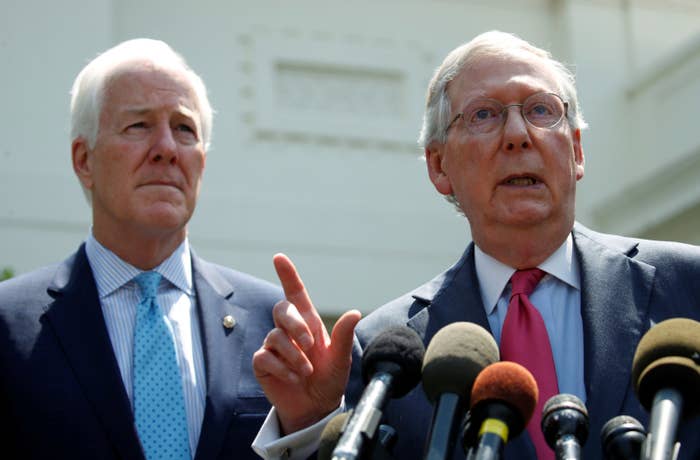
Repealing Obamacare without a replacement plan would lead to 32 million more uninsured people in 2026 than under current law, as insurance companies would flee the individual market en masse, according to a new Congressional Budget Office report.
A so-called straight repeal of Obamacare without a replacement plan is one of the options being bandied about by Senate Republicans as they try to reach a last-minute deal on health care reform. The proposal is to pass a repeal bill with a two-year delay, giving Congress a hard deadline by which to put a new system in place.
It’s not clear whether Republicans will ultimately opt to vote on this plan, and it’s even more questionable that it would pass. But the CBO report lays out what the potential long-term effects of repeal without replacement would be.
The bill would lead to 32 million more uninsured people in a decade compared to the current system, according to the CBO. That is 10 million more uninsured people than what the most recent Republican repeal and replace bill would have led to, per CBO projections.
The individual markets are projected to be thrown into turmoil. Republicans cannot repeal all of Obamacare’s regulations without 60 votes in the Senate — which would require cooperation from Democrats. So the bill would essentially keep certain rules on insurance companies in place while removing federal support to help pay for them.
The CBO projects that this would lead to a mass exodus of insurance companies from the individual market, leaving half of Americans living in areas where no insurer is offering a plan on the individual market by 2026. For those who are able to stay insured, premiums are projected to double over the next decade.
The bill would cut $842 billion in Medicaid funding by 2026, as well as repealing hundreds of billions of dollars in taxes. The net result would be $473 billion in savings to the federal government.
The straight repeal plan was raised Monday after Republican support collapsed for their replacement bill. Senate Majority Leader Mitch McConnell then floated straight repeal as an alternative, since it had already been passed by Congress in 2015, before being vetoed by President Obama.
But within 24 hours three Republicans — Sens. Susan Collins, Lisa Murkowski and Shelley Moore Capito — declared they would not support a motion to proceed to a vote on straight repeal. It takes just two Republicans to block the bill. Unless someone changes their mind, this plan could not pass the Senate.
Republicans were in disarray after a health care meeting with President Trump at the White House on Wednesday. Many, including Senate Majority Whip John Cornyn, said they did not know if their current plan is to pursue straight repeal, or repeal and replace. Both options seem to lack the 50 votes needed to pass the Senate.
Regardless, SMcConnell insisted that there will be a vote next Tuesday on a motion to proceed to a vote on a health care bill — despite no one seeming to know which bill they will be voting on.

